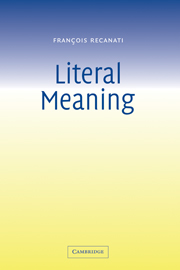Book contents
- Frontmatter
- Contents
- Acknowledgments
- Introduction
- 1 Two approaches to ‘what is said’
- 2 Primary pragmatic processes
- 3 Relevance-theoretic objections
- 4 The Syncretic View
- 5 Non-literal uses
- 6 From Literalism to Contextualism
- 7 Indexicalism and the Binding Fallacy
- 8 Circumstances of evaluation
- 9 Contextualism: how far can we go?
- Conclusion
- Bibliography
- Index
7 - Indexicalism and the Binding Fallacy
Published online by Cambridge University Press: 08 January 2010
- Frontmatter
- Contents
- Acknowledgments
- Introduction
- 1 Two approaches to ‘what is said’
- 2 Primary pragmatic processes
- 3 Relevance-theoretic objections
- 4 The Syncretic View
- 5 Non-literal uses
- 6 From Literalism to Contextualism
- 7 Indexicalism and the Binding Fallacy
- 8 Circumstances of evaluation
- 9 Contextualism: how far can we go?
- Conclusion
- Bibliography
- Index
Summary
Mandatory vs optional
What characterizes contextual ingredients of the optional variety is the fact that their contextual provision is not mandatory – it is not required in virtue of a linguistic convention governing the use of a particular construction (or class of constructions). In context, it may be that that ingredient is ‘required’; but then it is required in virtue of features of the context, not in virtue of linguistic properties of the expression-type. A contextual ingredient is mandatory in the relevant sense, and is provided through saturation, only if in every context such an ingredient has to be provided (precisely because the need for saturation is not a contextual matter, but a context-independent property of the expression-type). This, then, is the criterion we must use for deciding whether a contextual ingredient results from an optional pragmatic process or from saturation: can we imagine a context in which the same words are used normally, and a truth-evaluable statement is made, yet no such ingredient is provided?
To illustrate the contrast between the two types of pragmatic process, let us consider the phenomenon of ‘null instantiation’ (to use Fillmore's terminology), where the direct object of a transitive verb is not syntactically realized, or at least not overtly. There are two sorts of case, which must be sharply distinguished. In indefinite null instantiation (INI), the argument role corresponding to the direct object is existentially quantified instead of being assigned a particular value.
- Type
- Chapter
- Information
- Literal Meaning , pp. 98 - 114Publisher: Cambridge University PressPrint publication year: 2003



